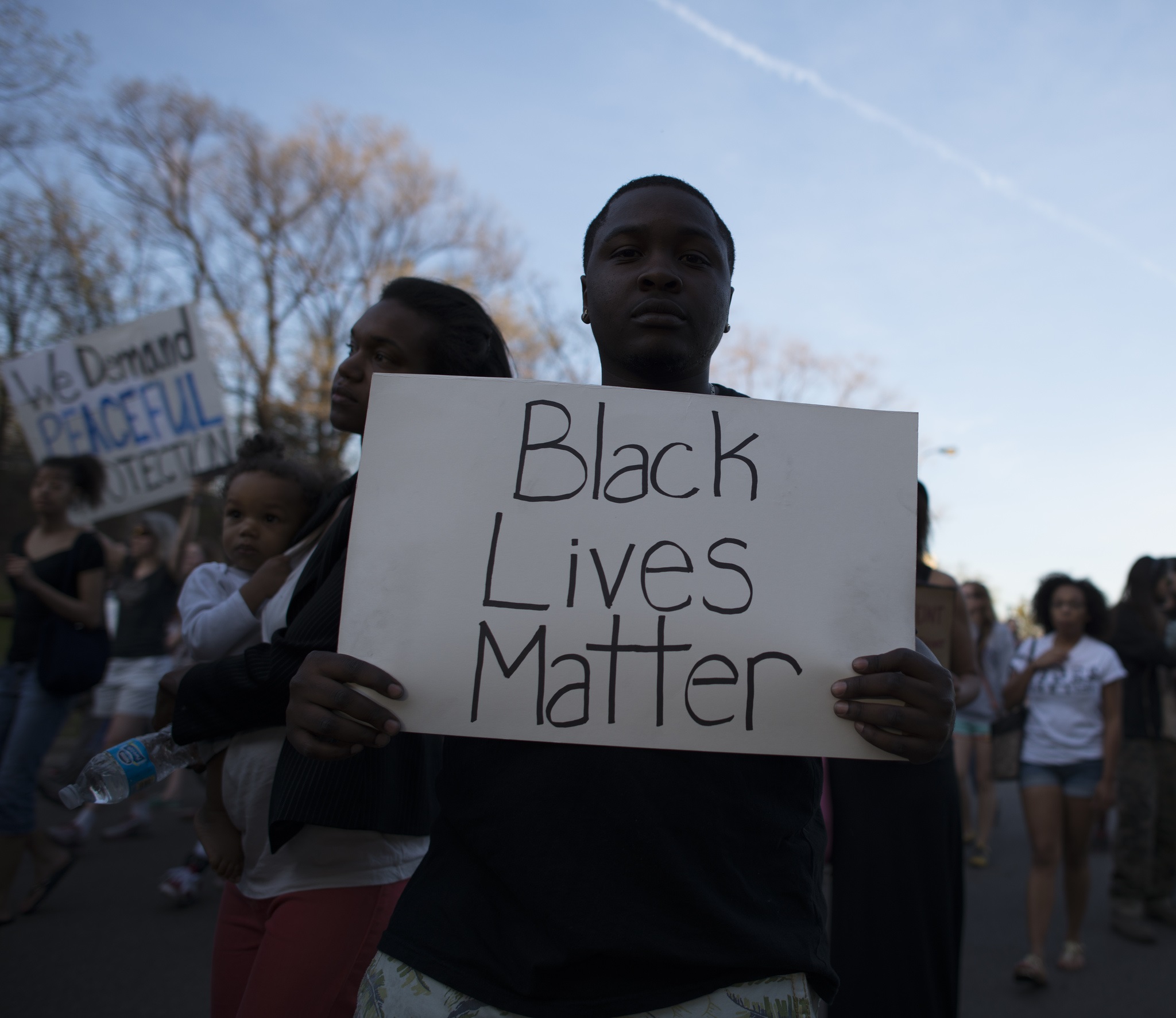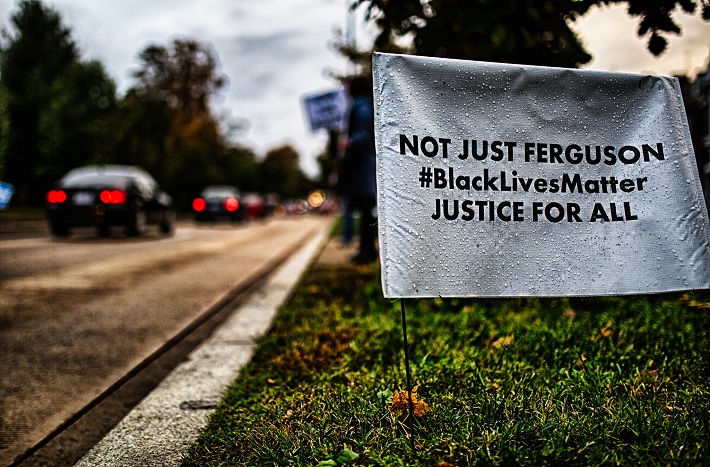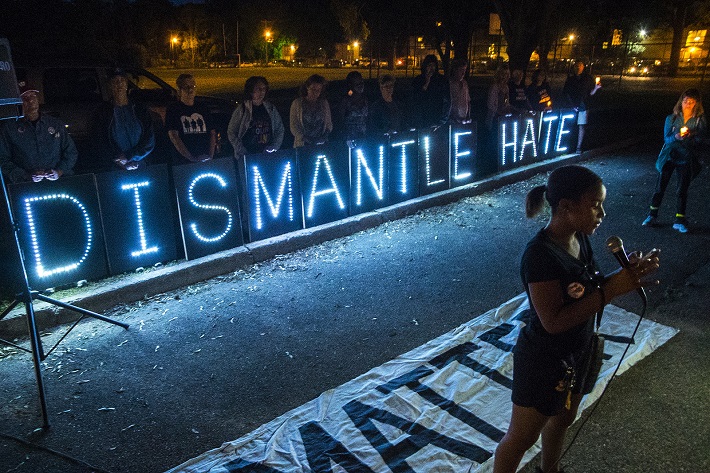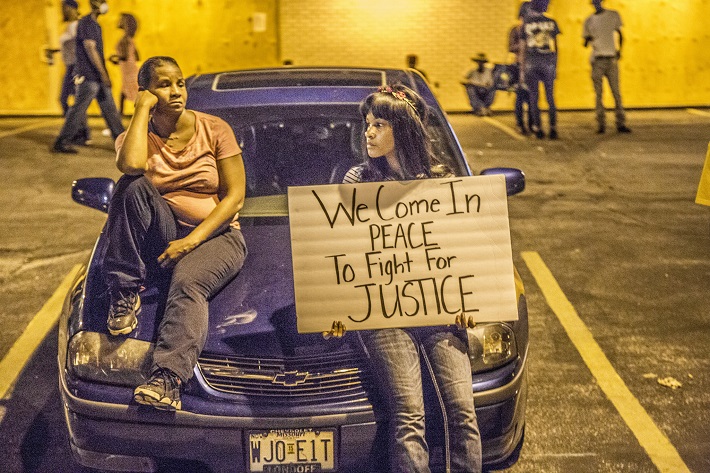
Black Lives Matter by fibonacci blue via Flickr CC fibonacci blue / fibonacci blue via Flickr CC license
In addition to endorsing A Vision for Black Lives in September, the AFSC Board also endorsed a minute from the Fellowship of Friends of African Descent on state sanctioned violence. In addition to study and consideration of A Vision for Black Lives, we at AFSC also commend this minute to Quaker meetings and bodies for consideration.
“Black humanity and dignity requires Black political will and power. In response to the sustained and increasingly visible violence against Black communities in the U.S. and globally, a collective of more than 50 organizations representing thousands of Black people from across the country have come together with renewed energy and purpose to articulate a common vision and agenda. We are a collective that centers and is rooted in Black communities, but we recognize we have a shared struggle with all oppressed people; collective liberation will be a product of all of our work.” – The Movement for Black Lives
In September the American Friends Service Committee Board of Directors found unity to endorse the Movement for Black Lives platform, A Vision for Black Lives, and to work through our aligned programs towards the realization of the vision.

A group of staff, volunteers and partners urged us to consider the platform as a way to support the Black Lives Matter movement and re-engage in the work left undone in the Civil Rights Movement—the hard work of dismantling systemic racism. AFSC was one of few white led organizations offering principled support for the Civil Rights movement when it emerged. Today we are building on that legacy by supporting the new Black Freedom movement.
The moral imperative to endorse the Vision for Black Lives Platform is reinforced by the recent report to the UN’s High Commissioner on Human Rights from the United Nations Working Group of Experts on People of African Descent. The Working Group found a continuing connection between present injustices and the troubling history of the United States.
In particular, the legacy of colonial history, enslavement, racial subordination and segregation, racial terrorism and racial inequality in the United States remains a serious challenge, as there has been no real commitment to reparations and to truth and reconciliation for people of African descent. Contemporary police killings and the trauma that they create are reminiscent of the past racial terror of lynching.

Referencing the past year’s succession of police killings of Black people, the report said "impunity for state violence," is a "human rights crisis" that "must be addressed as a matter of urgency."
The Movement for Black Lives Platform includes six demands:
- ending the war on Black people;
- reparations for harms;
- investments in education, health, and safety and divestment from criminalizing, caging, and harming Black people;
- economic justice for all and collective ownership for Black people;
- control of laws, institutions, and policies by those most impacted; and
- full and independent Black political power and Black self-determination.
The Movement for Black Lives Platform aligns well with AFSC’s key areas of work: building peace, immigrant rights, addressing prisons, just economies, and ending racism and discrimination. AFSC is listed as an organization working on policy around the Invest-Divest demand in the Movement for Black Lives Platform. Our work on ending mass incarceration, economic activism, and militarization is also directly related. Most importantly, AFSC also shares core values with the Movement for Black Lives, namely a commitment to and practice of nonviolence as a way to achieve social justice.
Next April marks AFSC’s 100th anniversary. Over 99 years, we have preached the messages of Friends Testimonies, not through our words, but through our deeds. We have born witness to many struggles for civil and human rights, knowing that injustice anywhere is a threat to justice everywhere. We helped Jews escape Hitler’s Europe, supported Americans of Japanese descent imprisoned in U.S. internment camps during World War II, supported the Civil Rights Movement in the U.S., and were a key voice in the boycott against Apartheid South Africa.

Today we are called by those same enduring Quaker principles to join a Black-led nonviolent movement to dismantle and transform the racist systems that have taken and continue to take so many Black Lives. As we have examined the Vision for Black Lives, we have found an approach that resonates with Quaker testimonies, with AFSC’s mission and vision, and with the Shared Security framework jointly developed by AFSC and FCNL in 2013. The Movement for Black Lives proposals clearly recognize that oppression aimed at any one of us diminishes all of us. Being so connected, we must work together, united, across issues and geography to build nonviolent power for change.
We know that many Friends and Friends meetings and churches are troubled by the increasingly visible violence that led Black communities to feel the need to proclaim that Black Lives Matter. We encourage Friends to read the Vision for Black Lives policy proposals and consider whether the vision described is consistent with Quaker principles. We invite you to consider whether and how you or your meeting or church might support the Movement for Black Lives in their visionary goals. We encourage you to reach out to local groups working toward these goals, to build relationships with other people working in this new movement for justice. Please let us know what you learn in your deliberations and share the ways you find to support peace and justice for Black Lives.
Related Content
AFSC endorses Movement for Black Lives Platform
Movement for Black Lives AFSC resource page